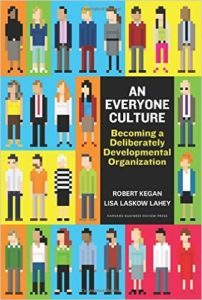 What if your organization focused more on growing people rather than profits? People at all levels develop and the profits follow.
What if your organization focused more on growing people rather than profits? People at all levels develop and the profits follow.
That’s the principle of a “deliberatively developmental organization (DDO),” as described in An Everyone Culture: Becoming a Deliberately Developmental Organization by Robert Kegan and Lisa Laskow Lahey.
And it works in practice, according to these experts in in organizational development. (By the way, the two authors also wrote Immunity to Change and How the Way We Talk Can Change the Way We Work.)
Their research shows that the three DDOs featured in their book, including the well-respected Bridgewater Associates, are profitable not in spite of human development but because of it.
DDOs not only devote resources to developing all employees, but they also have created cultures that emphasize development first. Their cultures are just as or even more important than their business strategies.
In fact, Bridgewater says its “unique success is the direct result of our unique way of being. We want an idea meritocracy in which meaningful work and meaningful relationships are pursued through radical truth and radical transparency.”
For employees interested in self-development, working at a DDO is a powerful pull. Individuals earn competitive pay. Plus, they enjoy other valuable benefits, such as challenging work, stimulating colleagues, and a strong sense of purpose and meaning.
The three featured DDOs have incorporated personal development throughout their regular operations, daily routines, and conversations both inside and out of meetings.
For example, the organizations value candor, feedback, transparency, vulnerability, responsibility (for self, for team, organization and community), and strong leadership without the trappings of high status. All of these element work together to help employees sustain a growth mindset and continue fulfilling their potential.
While the authors are understandably enthusiastic about this innovative approach to organizational culture, they recognize that it may not work for everyone.
For instance, organizations that are dealing with business challenges that require more incremental than radical change, may not want to bother.
By contrast, if you’re experiencing a VUCA (volatile, uncertain, complex, and ambiguous) business environment, you may need to be more adaptive than you currently are. A DDO that supports adaptive people and processes as they flourish may keep your organization more relevant and successful.
However, what if you’re committed to growing and improving, but don’t work for a DDO?
The six students in the Organizational Behavior & Change class at the College of Charleston who read the book with me in our book circle tackled this question, primarily at my insistence. DDOs are still very rare, and it may take years – or even generations — for the trend to spread.
The students suggested some very practical suggestions to continue their learning and development, including:
- Watch for others who model development growth and adopt their actions that appeal to you.
- Become developmental buddies with someone you like and trust.
- Seek bite-sized, regular, meaningful, feedback from trusted observers.
- Ask your manager to support you with your personal growth agenda.
- Create an immunity-to-change map for your most important growth goals.
Where there’s a will, there’s a way, as the old expression says.
Yet, the environment we live and work in influences us greatly, often more than we like to admit. For example, if the environment supports bad eating, sleeping, and working habits, it’s hard to be good in such a bad world.
That’s one of the reasons why a culture of personal development for all employees is so appealing. Hopefully, we’ll see more organizations discovering that their performance improves when they focus on fulfilling individuals’ desires to grow and develop and organizational cultures will dramatically change.
Until then, what are you doing to keep growing?

0 Comments